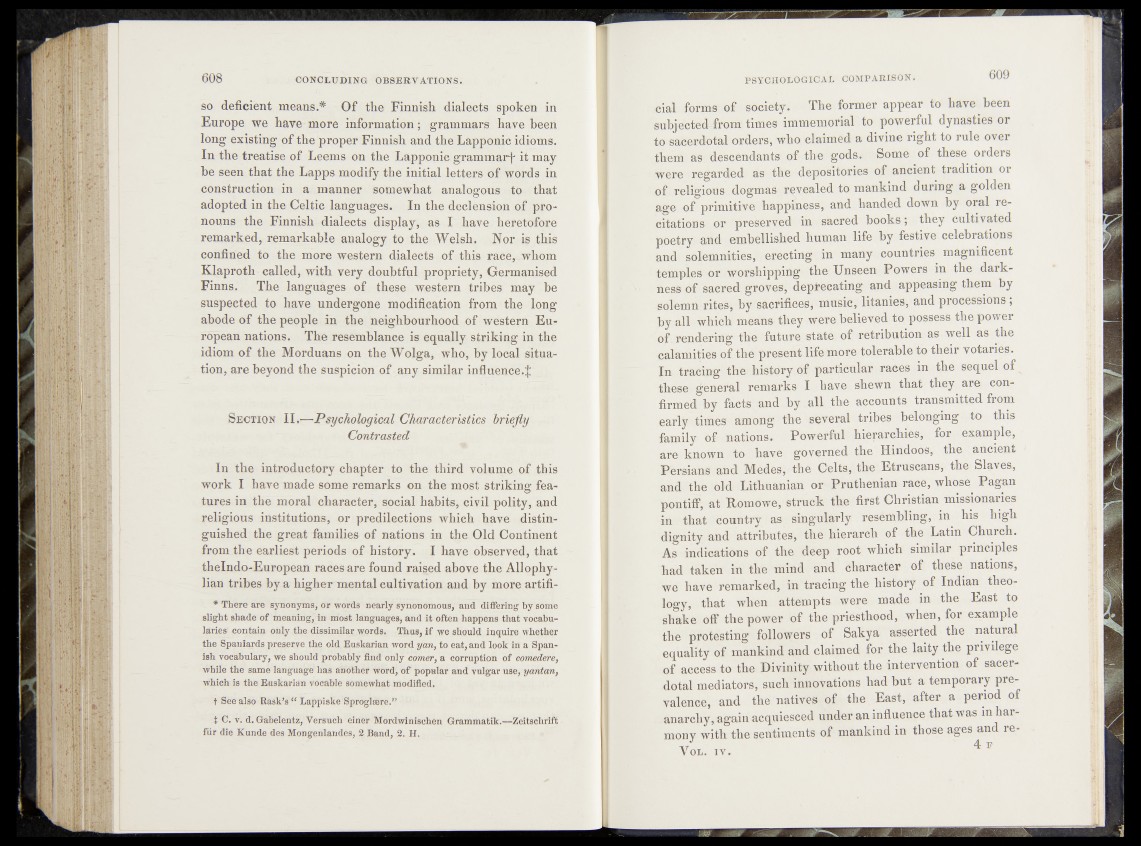
so deficient means.* Of the Finnish dialects spoken iÉ
Europe we have- more information ; grammars have been
long existing of the proper Finnish and the Lapponic idioms.
In the treatise of Leems on the Lapponic grammarf it may
he seen that the Lapps modify the initial letters of words in
construction in a manner somewhat analogous to that
adopted in the Celtic languages. In the declension of pronouns
the Finnish dialects display, as I have heretofore
remarked, remarkable analogy to the Welsh. Nor is this
confined to the more western dialects of this race,..whom
Klaproth called, with very doubtful propriety, Germanised
Finns. The languages of these western tribes may be
suspected to have undergone modification from the long
abode of the people in the neighbourhood of western European
nations. The resemblance is equally striking in the
idiom of the Morduans on the Wolga, who, by local situation,
are beyond the suspicion of any similar influence.^
S e c t io n II .—Psychological Characteristics briefly
Contrasted
In the introductory chapter to the third volume of this
work I have made some remarks on the most striking features
in the moral character, social habits, civil polity, and
religious institutions, or predilections which have distinguished
the great families of nations in the Old Continent
from the earliest periods of history. I have observed, that
thelndo-European races are found raided above the Allophy-
lian tribes by a higher mental cultivation and by more artifi-
* There are synonyms, or words nearly synonomous, and differing by some
slight shade of meaning, in most languages, and it often happens that vocabularies'
contain only the dissimilar words. Thus, if we should inquire whether
the Spaniards preserve the old Eusfcarian word pan, to eat, and look in a Spanish
vocabulary, we should probably find only comer, a corruption of comedere,
while the same language has another word, o f popular and vulgar use, yantan,
which.is the Enskaridn vocable somewhat modified.
t See also Rask’s “ Lappiske Sproglsfere.” ■
t C. v. d. Gabelentz, Versuch einer Mordwinischen Grammatik.—Zeitschrift
fur die Kunde des Mongenlandes, 2 Band, 2. H.
cial forms of society. The former appear to have been
subjëctecLfrom times immemorial to powerful dynasties or
to sacerdotal orders, whoi'claimed a divine right to rule over
them as descendants, of the gods. Some of these orders
were regarded as the depositories of ancient tradition or
of religious dogmas revealed to mankind during a golden
age of primitive happiness, and handed down by oral recitations
or preserved' in sacred books ; they cultivated
poetry and embellished human life by festive celebrations
and solemnities^ejecting in many countries magnificent
temples or worshipping the Unseen Powers i|fc4he darkness
of sacred groves, depffecating and appeasing them by
solemn rites, by sacrifices, music, litanies, and processions ;
tby all which means they werè believed to possess the power
of. rendering the future state, of retribution as well as the
calamities of the present life more tolerable to their votaries.
In tracing the history of particular races in the.sequel of ^
these general remarks I have shewn that they. are! eön-
firmeiby facts and. by .all the accounts] transmitted from
early times- among the -several tribes belonging to this
family of nations^ Powerful hierarchies, for**' example,
are known to have governed the Hindoos-;; the ancient
Persians and Medes, the Celts, % .E n c a n s , the S1^ves’
and the old Lithuanian or Pruthenian race, whose Pagan
pontiff, at Romowe, struck the first Christian missionaries
in that country as singularly resembling, in his high
dignity and attributes, the hierarch of ^fhe Latin Church.
As indications of the deep root which similar principles
had taken in the mind and character of these nations,
we have remarked, in tracing the history of Indian theology,
that when attempts were , made in the East to
shake off the power of the priesthood, when, for example
the proteisting followers of Sakya' asserted the natural
equality of mankind and claimed for the laity the privilege
of access to the Divinity without-the intervention of sacerdotal
mediators, such innovations had but a temporary prevalence,
and the natives of the East, after a period of
„ anarchy, again acquiesced under an influence that was inharr
mony with the sentiments of mankind in those ages and re-
VoL. IV . ^ F